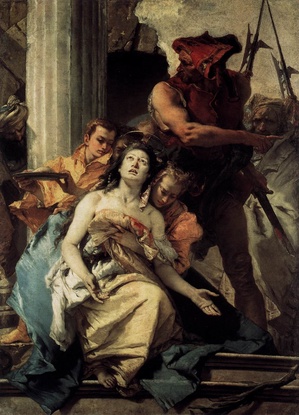“Those who are unequal in their capacity to give can
be equal in the love within their hearts.”
Category: Spiritual Life
Planted in the Lord
Today’s first reading and Gospel ask the question (Mar 6, 2011): how, in fact, are we grounded in the Lord? Have I allowed Christ to enter into my life sufficiently and without reservation? Am I aware that Christ takes the initiative in calling me to a deeper conversion and that I have to respond? In your lectio divina today, set out to ground yourself in the Lord.
Pope Benedict’s message for the 2011 World Youth Day participants draws this line of thinking out:
“We … want to be able to see Jesus, to speak with him and to feel his presence even more powerfully. For many people today, it has become difficult to approach Jesus. There are so many images of Jesus in circulation which, while claiming to be scientific, detract from his greatness and the uniqueness of his person. That is why, after many years of study and reflection, I thought of sharing something of my own personal encounter with Jesus by writing a book. It was a way to help others see, hear and touch the Lord in whom God came to us in order to make himself known. Jesus himself, when he appeared again to his disciples a week later, said to Thomas: “Put your finger here and see my hands. Reach out your hand and put it in my side. Do not doubt but believe” (Jn 20:27). We too can have tangible contact with Jesus and put our hand, so to speak, upon the signs of his Passion, the signs of his love. It is in the sacraments that he draws particularly near to us and gives himself to us. Dear young people, learn to “see” and to “meet” Jesus in the Eucharist, where he is present and close to us, and even becomes food for our journey. In the sacrament of Penance the Lord reveals his mercy and always grants us his forgiveness. Recognize and serve Jesus in the poor, the sick, and in our brothers and sisters who are in difficulty and in need of help.”
Lent begins with Ash Wednesday on March 9. What is on your list of Bona Opera, your good works? Chapter 49 of the Rule of Saint Benedict speaks of the monk (here, all people) keeping Lent in front of our eyes all the time. He urges us, therefore, to do good, to keep purity in our hearts and minds by refraining from evil. Saint Benedict exhorts us to restrain ourselves from sinful habits and to devote time to prayer of the heart, fasting, lectio divina, compunction, ascetism, and charitable work.
How are you going to build your spiritual life on solid ground? In what ways are you going to be a spiritual father and mother to another? Will you pray, fast and give alms to the good works of the Church uniting your intentions with the Sacred Heart of Jesus for sake of poor, needy, the Church, the Pope, sinful people and priests, etc? Will you study the Word of God and spend time in prayer before the Blessed Sacrament?
Prayer: personal & lived in communio
Thinking about uniting ourselves closely to Christ I
was wondering what prayer is and it is connected with my relationship with Him. The Pope said earlier this month that “prayer, on the one
hand, must be very personal, a uniting of myself with God in my innermost
depths. It must be my struggle with Him, my search for Him, my gratitude for
Him and my joy in Him. Yet it is never something private of my individual ‘ego’
that does not concern others. Praying is essentially and also always praying in
the ‘we’ of God’s children. “In this ‘we’ alone are we children of Our Father,
which the Lord taught us to pray. This ‘we’ alone gives us access to the
Father. On the one hand our prayer must become more and more personal, must
touch and penetrate ever more deeply the nucleus of our ‘ego’. On the other, it
must always be nourished by the communion of those praying, by the unity of the
Body of Christ, in order truly to shape myself on the basis of God’s love” (Benedict
XVI, Homily for Episcopal Ordinations, 5 Feb 2011).
The Catholic’s perpetual second chance
I try to communicate to others, particularly the friends I teach about the Catholic faith, that to be authentically Catholic one has to fall in love with Jesus, and to do what He does. Mercy and love are constitutive parts of being called a Christian. This not always easy. It is a human struggle for many. But we are called by the Lord Himself to love and pray for your enemies; have mercy on the sinner; forgive injuries; feed the hungry. Not willing to do this, then it would be pretty hard to convince others that your proposed faith in Christ as Lord and Savior is true. The Pope’s Angelus address earlier today gives us a clue to my point: to be a Catholic means living in the mindset of having a perpetual second chance. Read the 2 papal paragraphs:
On this seventh
Sunday of Ordinary Time the biblical readings speak to us about God’s will to
make men participants in his life: “Be holy because I the Lord your God am
holy,” we read in the Book of Leviticus (19:1). With these words and the precepts
that follow from them, the Lord invited the Chosen People to be faithful to the
covenant with him, walking in his ways, and established the social legislation
on the commandment that says that “you will love your neighbor as yourself”
(Leviticus 19:18). If we listen, then, to Jesus in whom God took on a mortal
body to become every man’s neighbor and reveal his infinite love for us, we
hear again that same call, that same objective audacity. The Lord, in fact,
says: “Be perfect as your Father in heaven is perfect” (Matthew 5:48). But who
can become perfect? Our perfection is to live as children of God in humility
concretely doing his will. St. Cyprian wrote that “to God’s paternity there
must correspond a conduct as children of God so that God might be glorified and
praised by man’s good conduct” (De zelo et livore, 15: CCL 3a, 83).
In what way
can we imitate Jesus? Jesus himself says: “Love your enemies and pray for those
who persecute you so that you will be children of your Father who is in heaven”
(Matthew 5:44-45). He who welcomes the Lord in his life and loves him with all
of his heart can begin again. He is able to do God’s will: to realize a new
form of existence animated by love and destined for eternity. Paul the Apostle
adds: “Do you not know that you are God’s temple and that God’s Spirit lives in
you?” (1 Corinthians 3:16). If we are truly aware of this reality and our life
is deeply formed by it, then our witness becomes clear, eloquent and
efficacious. An [early Christian] author wrote: “When the whole being of man is
mixed, so to speak, with God’s love, then his soul’s splendor is also reflected
on the outside” (John Climacus, Scala Paradisi, XXX: PG 88, 1157 B), in the
whole of his life. “Love is a great thing,” we read in “The Imitation of
Christ,” [it is] “a good that makes every heavy thing light and easily endures
every hardship. Love aspires to sail on high, not to be held back by any
earthly thing. It is born of God and only in God can it find rest” (III, V, 3).
Did God Correct Himself?
Today’s Gospel from Saint Matthew poses a crucial question for our following Christ: How do we do it? The line that is frequently often misunderstand:
was said, An eye for an eye and a tooth for a tooth. But I say to you, offer no
resistance to one who is evil.
try to keep the mind in quietness. For if the eye is constantly shifting its
gaze, one moment this way or that, then veering between upwards and down, it
cannot see clearly what lies directly in front of it. It has to bring its
gaze to bear on this object so as to see it clearly in focus. In the same way a
mind distracted by thousands of worldly concerns cannot possibly bring a steady
gaze to bear on the truth.
Discovering the Way: El Camino de Santiago
 Salt + Light TV has given a wonderful gift in doing a terrific story on the ancient pilgrimage trail called in Spanish, El Camino de Santiago. The Way of Saint James. Alessia Domanico is the host of “Discovering the Way: El Camino de Santiago.”
Salt + Light TV has given a wonderful gift in doing a terrific story on the ancient pilgrimage trail called in Spanish, El Camino de Santiago. The Way of Saint James. Alessia Domanico is the host of “Discovering the Way: El Camino de Santiago.”
- a great adventure, go for a purpose: you’ll grow spiritually and physically
- an opportunity to pray, to do penance, to be reminded of tradition
- catechesis on the faith
- an opportunity to learn Christian and civil history
- to know your own humanity, that of the other
- learn and experience the christian faith
- have the goal to go to the Cathedral of Saint James to visit the relics of a great Apostle.
Charity is the only good reason to do anything
The Cistercian
monk, philosopher and theologian Isaac of Stella (1100-1169) was featured in
the Office of Readings today: Charity is the reason why anything should be done
or left undone.
Charity is the only good reason to do anything, but it also
sometimes demands that we not do something we might think we want to do. There
are a lot of fine distinctions one has to make in this area to live spiritually
in common life and ministry. For example:
- We are called to support one another,
but not to enable maladaptive behaviors, debilitating addictions, and sins. We
must bear with the burdens of others, and be willing to wash feet, but we
should not take responsibility for the feelings of others. - We must seek ways to
invite both individuals and institutions to benefit from our strengths, and
invite them into the success that derives from them, but–again–we should be
careful not to take interior or exterior responsibility for situations that the
Holy Spirit has not, or not yet, seen fit to put in our care. - Sometimes the
greatest charity–and often the most painful–is not giving someone what he
thinks he wants. - We must be good to ourselves, practicing good self-care, but
that doesn’t mean taking it easy and just ‘being nice’ to ourselves. On the one
hand, we must not be so hard on ourselves that our whole spiritual life becomes
a rehearsal of faults and sins, for this is one of the devil’s tricks in making
us fail to notice God, and on the other we must also be careful not be overly
forgiving of ourselves so as to effectively give up struggling with certain
selfishnesses and sins. - We must practice the sort of self-charity that
nourishes our gifts and virtues, and is ruthless in the unwillingness to put up
with sin.
Breast cancer and St Agatha: supporting those who live with the disease
 The Church has a ministry, a role, a work, in helping to restore a person to health and wholeness because the Church is the continuation of Jesus’ ministry of healing in the world today.
The Church has a ministry, a role, a work, in helping to restore a person to health and wholeness because the Church is the continuation of Jesus’ ministry of healing in the world today.
- curing and healing, a distinction here: we ask God for a cure, we ask also ask for a healing; the person is looking for God to bestow the grace of a comprehensive experience of restoration of body and spirit — “the whole person is helped and saved, sustained by trust in God, and strengthened against the temptations of the Evil One and against anxiety over death”; the relationship between God and the person is bridged in the sacrament;
- the gift of strengthening against debilitating effects of despair, depression, fear and anger; this Sacrament asks God for the grace to recognize and hopefully to unite any and all suffering to the experience Christ faced on the cross; the strength prayed for is not to allow illness to define their person because one’s humanity is more than a medical diagnosis;
- forgiveness of one’s sins: no human person –except Jesus (and He was also divine) and the Virgin Mary were sinless– and therefore sins are forgiven with this Sacrament; our human condition is frail and sickness can enhance the ugly side of ourselves and what we need and want is a healing of the soul; the effect of forgiveness is the reconciliation of the person to God, self and others; I think it is true that an illness has the potential to bring out of ourselves sinful attitudes, actions and patterns of speech that are not truly who we are as persons;
- a preparation for life with God, i.e., eternal life: no one is going to live for ever; perhaps the sickness is an opportunity to take stock in one’s life as it has been lived up to now and to patiently and lovingly make a life’s examination to see where there’s been love and to see where love has been absent; sickness is God’s way to call us to a deeper conversion that we’ve never experienced prior to this moment; here the Sacrament is asking us to look at our immortal soul with a degree of seriousness and the sickness as an education to greater freedom in Christ;
- conforming oneself to Christ crucified and risen: to be conformed to Christ means to adhere to Him, to listen to Him as we would listen to a loved one in friendship; there is a new reality in the life of a Christian –Jesus Christ is no longer dead, He’s risen; that Christ is risen and seated at the right hand of God the Father tells us of a new reality, a fact, in our human existence; the Sacrament brings us closer to cross Christ carried and died on and tells us that our salvation is there on the cross with Christ; we are not alone –we are with Jesus who is total love, total compassion; the healing offered in this sacrament is one of total trust and love in the One who made us, sustains us and carries us along with Him.
Real change in history not administrative but of the heart, Discalced Carmelite superior says
Personal and corporate renewal is always a timely topic. Recently, the Superior General of the Discalced
Carmelites, Father Saverio Cannistrà, speaking about the hope of renewing his
order answered a question in what he saw as essential to renewal. I think the renewal is not only for the Carmelites but for all us. Don’t you think?
“it is rather like the way of prayer Saint Teresa [of Avila] talks about: a growth that
happens day by day, passing through moments of consolation and desolation, but
with the determination to forge ahead, without giving up. The real changes
which have had an effect on history, are not mere administrative reorganizations:
they are changes of heart, as Scripture tells us. If we do not expose our heart
to the beneficial tempest of the Spirit, then generous and prophetic
initiatives cannot be born from it. Formation, both initial and ongoing, would
probably be the sole help that we could offer, as an institution, to tread this
path.”
The way of sanctity lies open to you
 Today the Pontifical Ethiopian College enjoyed time
Today the Pontifical Ethiopian College enjoyed time
with Pope Benedict XVI on the occasion to mark the 150th anniversary of the
death of Saint Justin de Jacobis (1800-1860), patron of the College. The
Ethiopian College prepares men for priestly service in their home country. Part
of the Pope’s address was devoted to holiness. On holiness the Pope said:
“Sanctity lies at the very heart
of the ecclesial mystery; it is the vocation to which we are all called. Saints
are not some exterior ornamentation of the Church; rather, they are like the
flowers of a tree which testify to the endless vitality of the lymph flowing
through it. It is good to see the Church like this, in ascension towards the
fullness of the ‘Vir perfectus’; in continual, demanding, progressive
maturation; dynamically driven towards complete fulfilment in Christ.”
